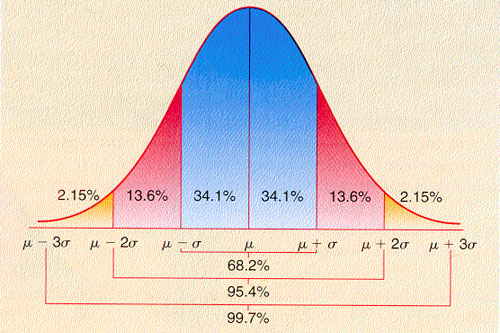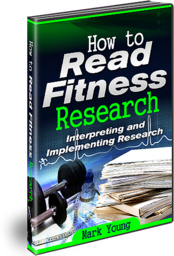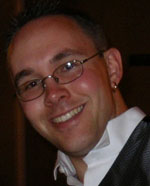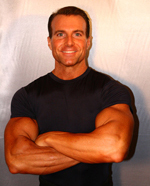How valuable and time-saving would it be if you could: 1) instantly spot a diet or supplement scam, 2) fact-check any article, advertisement or news story for accuracy by yourself, 3) look like a genius in any debate or discussion about fitness myths, 4) cut right through internet information overload with razor-sharp critical thinking? If you learn this one skill – how to read fitness research – that’s exactly what you’ll be able to do… Learn how in this 2 part interview with Tom Venuto and Mark Young
How To Read Fitness Research: Tom Venuto Interviews Mark Young, Part 1
Tom: Mark, thank you for the interview. You’re rapidly getting a reputation in the fitness community as a fitness science guy and the “how to read research” guy, so most of the people in the evidence-based part of the industry already know you, but in case any of my readers aren’t familiar with you yet, could give us your quick bio with your professional background.
Mark: Thanks for having me Tom. In terms of my academic background, I have a degree in kinesiology and a minor in psychology from McMaster University. I have also also done graduate level research in biomechanics and exercise physiology as part of the world-renowned exercise metabolism research group under the guidance of Dr. Stuart Phillips. My grad thesis work comparing the effects of eccentric and concentric contractions on muscle growth is submitted and awaiting publication (hopefully) in a major peer reviewed journal.
On the applied side of things, I’ve been a strength coach (or trainer…or whatever you want to call it) for about 11 years now and my work has been published on T-Nation.com, WannaBeBig.com, StrengthCoach.com, MuscleAndFitness.com, and MuscleAndFitnessHers.com to name a few.
On top of all that, I provide services to one of Canada’s very few government funded Bariatric Medical Programs for the evidence based treatment of obesity.
Tom: I mentioned the term evidence-based, and I know that’s a term you use a lot as well but I think a lot of people don’t even know what that means. Could you give us your definition and tell us why this is important?
Mark: To me, being evidence based means that the methods you use are based primarily upon studies used to test their validity. In other words, evidence based folks use available research not only to support, but to challenge their methods to determine if they stand up to scientific scrutiny.
I feel this is very important because there is so much information out there (especially on the internet) and the only real way to discern what is truly valuable from what is simply opinion or even complete BS is to look to well controlled scientific studies. This can show us what actually works.
Being subject to only the opinions and interpretations of others on the internet is like playing the telephone game. Occasionally you’ll get the original message, but often it gets distorted. Sometimes information is even intentionally distorted to get us to purchase something we don’t even need. If you take action on that distorted information you could be headed down the wrong path with your physique and potentially your health.
Tom: You can count me as right there with you as part of the evidence based community, but let me play devil’s advocate for a minute: People debate all the time that a certain approach works for them because of the results they got. They may be proud of their results and their results may be indisputable to the eye. Next thing you know, they get slapped down in some forum on the basis that their “personal anecdote is meaningless” and someone tells them that the way they did it is all wrong because the research says so. If at the end of the day, results are what matters to a person, why should we care what the research says? Why don’t we just focus on results? Isn’t that evidence of the real-world kind?
Mark: At the end of the day, I agree that results matter most.
However, there are three points that I feel are worth making here. Statistically speaking, there will be a distribution in the way people respond to any program. In most situations a very small number of people (on the left in the graph below) will get minimal results, most people (in the center) will get the average result, and another very small number of people (on the right) will get incredible results. Beyond this, there are sometimes a few very fortunate people called outliers that lie outside of the normal distribution and have even crazier results than the rest. If the person on the forum is one of the people on the far right or even an outlier, he or she may have gotten great results with a specific program, but those may be much greater than would be expected by most others using the same program.

Secondly, I would argue that in the real world we often change many variables at once. The aforementioned guy on the forum may have adjusted his calorie intake, increased his protein, rotated his exercises and loading, took a new supplement, and seen great results. Then, before you know it, he’s on an internet forum arguing about the importance of carbohydrates in his post-workout nutrition and using his success to demonstrate his point. In truth though, it is impossible to know which of the things he’s done are responsible for his results. It could be one of them or all of them to varying degrees. Some of them may be having no impact at all. With research it is possible to control variables one at a time and determine which are actually most likely to have a real effect.
And finally, it is possible that all of the factors ARE contributing to the success of this particular person, but is doesn’t mean this is necessarily the ONLY way to get results. In this industry I think we sometimes get caught up in the either/or dichotomy when, in reality, there are usually many paths to the same goal. In this case, neither person is really right or wrong…just different. So when looking at and presenting research (and results) it is important to look at different methods for achieving the same goal.
Tom: Do you see any potential dangers in depending exclusively on scientific evidence while paying no attention to what’s happening in the real world? What do you think about the philosophy that says you should pay attention equally to what the research says AND what the real world says?
Mark: I agree that it would be just plain ignorant to not pay attention to what is happening in the real world.
My general thought process is that research is one of a couple filters we can use to process information. When I learn something new I first look at the research to determine if there is any support for and, equally as importantly, any research refuting the method. If it seems viable then I’ll apply it in my programming and see if it pans out in the real world which is what I’d consider my second level filter.
No matter what the research says, if you’re not getting results with a specific program then you need to modify or abandon it. You could either be one of those who gets poorer results to that program (on the left in the graph above) or perhaps there are other factors at play. Regardless, I think we should use both research and real world information to make decisions about our programs.
Tom: There’s an old story about Arnold Schwarzenegger in his mid 1970’s prime doing a seminar with a PhD scientist. A member of the audience asks a question and both Arnold and the scientist answer, but they disagree with each other. Of course, now the guy in the audience is confused. So Arnold grins, looks at the guy, says “who are you going to believe? … HIM (Arnold smirks condescendingly at the skinny little scientist with pipe cleaner arms), or ME?” Then Arnold hits a front double biceps pose showing his mountain peak 20+ inch biceps. At that moment, Arnold’s charisma and muscles had won the questioner and the entire audience over completely.
Now, today people would call that broscience, which is the belief that if you want to learn how to get big arms, you should listen to the guy (the “bro”) with the biggest arms. That seems logical enough doesn’t it? But the anti-broscience crowd says that’s wrong – because the guy with the huge arms must have been on steroids, he must be a genetic freak, training is his job, and he probably got results in spite of how he trained his arms not because of it. Therefore, we should listen to the scientists about how to get big arms instead.
Now Mark, speaking as a guy who is evidence based, I see what’s right about this no broscience philosophy in a situation like the one I described, but also speaking as a drug free bodybuilder who would love another inch on his arms, I can also see what’s wrong with this attitude. What are your thoughts on this broscience thing?
Mark: I always think we should be cautious when making decisions based on someone’s appearance. They could very well be one of the outliers I mentioned above (Arnold sure was) or there could be steroid use, etc. That said, there is nothing wrong with taking their information and running it through the “research filter” to see if it has any merit or is at least scientifically plausible. If so, go ahead and give it a shot.
And I think the same goes for information coming from skinny guys or overweight guys. The information may be legit so it is important to check that out. Maybe they’re just not applying it.
I also want to say that as much as we might hate to admit it, a lot of the stuff we’ve come to know as broscience actually works. Maybe the specific suggestion is to only eat meat from animals with orange feathers, train exclusively with a TRX on one foot with your eyes closed, and do interval sprints on a unicycle. It sounds crazy, but as long as calorie needs are met, we’re getting protein, and the muscles are getting loaded we can see progress…especially with beginners.
Does this mean that the specific methods are necessary or optimal? Absolutely not. Do they work? Sure they do. And I feel that this is why proponents of various broscience methods are often die hard believers in their systems. As long as basic principles are met, the methods are probably less important. Reading research, to me, is about discovering the principles. Once you know these, you can work towards finding the best methods to achieve them.
Tom: People often talk about “cutting edge research” but some people say that the cutting edge of nutrition and training is NOT in the labs but in the trenches with the athletes and their coaches, and that in fact, in many cases, the researchers notice something going on in the trenches and only then do they decide to study it in a controlled environment. Would you agree or disagree that this happens? Where is the cutting edge research really taking place?
Mark: There is definitely something to be said for what the top people are doing out there in the trenches, but I wouldn’t call it research per se. Even in purely observational studies, research generally entails a process of ethics approval, the use of inclusion and exclusion criteria, control groups, and specific measured outcomes. This is generally not the case in gyms or performance facilities. Anyone who walks in the door and can pay for the services is included…and you’re most certainly not going to put them in a control group doing nothing when they’re spending the cash for coaching.
I do agree that practice sometimes inspires research and this is a good thing because this provides an opportunity to determine if the specific variable in question is actually responsible for the results or if it is something else entirely.
When practice precedes research, my general policy is to wait it out to see if it pans out in the research as I’ve rarely seen any truly groundbreaking protocols emerge that have truly changed the face of fitness. If they existed, we’d all know about them and we’d all be using them.
But I’m a bit of a slow to change (I don’t even have a smart phone yet) and when pressed to incorporate new things I’ll look to see if there is any scientific merit to the program by looking at the theories that are being proposed for its use. If it is seems viable, I’ll use it while keeping all other variables fairly steady and pay careful attention to see if there are any noticeable changes in outcomes as a result. If not, I scrap it.
Tom: If there’s any possibility that the athletes or top fitness achievers are ahead of the science and if we all agree that results are what counts, shouldn’t we put a lot of stock in looking at what the top people are doing in the weight loss or physique world? On the other hand, what are the dangers in trying to mimic the strategies of the top athletes?
Mark: As I alluded to earlier, many of the top athletes and fitness folks are outliers and their results are not representative of the results most of us could expect if we followed the same programs. They have genetic (and often pharmacological) advantages over most of us and it probably isn’t wise to blindly follow their methods.
Of course, we can put their methods under a microscope and see which of them stand up to scientific rigor. For the methods that do, it is probably safe to use them, but I think it comes down to knowing what you can personally handle. I’ve seen some training programs…and while they might work for the elite, they certainly aren’t a good fit for a novice or even someone who has real world responsibilities outside of fitness and different recovery capabilities.
I also want to point out that all this is dependent on the fact that the programs the athletes are reported to be on are true. I’ve heard of bodybuilders having their programs featured in magazines while having nothing to do with the actual writing of the article at all. So you also have to be careful of the source and whether the source is telling the truth in the first place.
Tom: I think that anyone who is interested in science and the evidence based approach has to be open to debate. But I have to say, the debates in the diet and fitness industries have certainly gotten “interesting” in the last decade as the internet has grown. Sometimes it’s like dueling abstracts and sometimes it seems one guy is like that monkey with his fingers in his ears – one side just aint hearing it and wont change no matter what evidence the other side presents. I’ve seen these things go in circles that are endless. What are your thoughts about online debates and dos and don’t of debate?
Mark: Frankly, I think that arguing on the internet is almost always a dead end street. It is a waste of time and it rarely helps anyone in any way except to become more entrenched in their own views. I have to admit that I’ve been guilty of this in the past and I try to avoid it when I can.
When I do engage in a discussion about a specific topic, rather than looking for studies to confirm my beliefs, I’m usually looking for someone to present something to contradict the methods that I’m currently using so I can investigate it further and determine whether the argument is valid. I’m definitely not perfect and am subject to falling in love with certain ideas and defending them just like everyone else, but I try to keep in mind that the purpose of research is to test rather than to confirm and that perspective usually helps me to gain the most out of online discussions.
In fact, I had an online debate with Alwyn Cosgrove a while back and it was one of the most valuable learning experiences I’ve had in a long time because I took seriously the information Alwyn presented, read the related research that he suggested, and came away with a new perspective that changed my methods. Had I just stuck to my guns and battled it out I wouldn’t have gained anything.
Tom: Do you think some people in the evidence-based community are becoming science snobs or debate bullies?
Mark: I’m going to stay away from naming people, but I definitely believe that this is sometimes the case. It appears some people are so dead set on “schooling” people that they’re unable to build a connection with them and actually educate them. This is really disappointing given the potential wealth of information that could be obtained if they’d just change the way the delivered their messages.
Someone once said to me “If you win a thousand battles you still have a thousand enemies. If you change a thousand minds, you have a thousand allies”. I wish that these folks would embrace this more, but I don’t think there is much we can do about that. All we can do is to exemplify the evidence based community in the most positive way we can and hope that others eventually follow suit.
As the expression goes, “lead by example”.
Tom: That’s a great quote and very true…

The “How to Read Fitness Research” (HTRFR) program is highly recommended for personal trainers, strength coaches, dieticians and anyone who is interested in nutrition or exercise science. It’s also invaluable for consumers for avoiding fitness scams, cutting through information overload and fact checking articles, advertisements or news stories for accuracy. The program is almost 40% off now through this Friday for Burn the Fat Blog readers. For more information, visit Mark’s website at: HowToReadFitnessResearch.com. (Note: Burn the Fat blog is an affiliate of HTRFR).
Copyright BurnTheFatBlog.com Do NOT copy. Unauthorized reproduction is prohibited.
About Mark Young

About Tom Venuto







Great article, Tom! Thank you very much for sharing.
I think we are all guilty of defending our steadfast beliefs in spite of contradictory evidence. Because something works for us we assume that our method is better or more superior to all other methods simply because we had success with it. However, deep down I think we all know there is “more than one way to skin a cat.” People can take divergent paths and arrive at the same destination. One course of action may be more timely and efficient than the other but ultimately the end result can be the same.
I believe if people could refrain from turning debates into “pissing contests” meant to demean or prove one’s superiority then a great deal of enlightened discourse could be shared. However, too many people debate with their ego in tact and when presented with contradictory evidence, take things very personally. Invariably this leads to ad homineum attacks and next thing you know, the debate becomes adversarial in nature. Once this line is crossed the message gets lost in the translation and both parties walk away with hurt feelings.
If people could learn to debate civilly without resorting to name calling or disparaging remarks, then everybody could benefit from the information being presented. However, this takes a certain level of maturity and consideration that many people are unfortunately lacking. Internet etiquette has deteriorated a great deal and this precludes many people from obtaining the knowledge that they are seeking.
Great interview. Those are some great insights. I agree with Mark that arguing and debating when it comes to all the conflicting ideas about fitness and training will get you nowhere. One of the reasons why Tom Venuto has credibility with me is because he has achieved results and relies on scientific principles, but also has common sense approach to fitness.
Good interview! I agree that there is always a balance between scientific and real-world (anecdotal) evidence. It took me years to learn this balance and not immediately “latch on” to the results and conclusions from new research. As I gained more experience in the industry, though, after working with hundreds of clients in over a decade of training, I learned to also take into consideration that I had more than 10 years of real-world case studies to draw upon.
Sometimes these would back up the research, but other times it would be obvious to me that the results of a study were NOT the norm and there was likely something else to explain it. If there’s one thing I took away from my research class in Grad School, it was to always ask, “What else could explain the result?” Always ask this question, along with benchmarking against your education, logic, common sense, and experience, and you can almost always come away with a pretty good understanding of what the research is actually telling you, and if it even has practical application to what you do and what your clients need.
Again, thanks for the article/interview and some good insight into research in the field. We can ALWAYS get better at it.
Great article! I really like his quote “If you win a thousand battles you still have a thousand enemies. If you change a thousand minds, you have a thousand allies”. As Scott the commenter noted, it often turns into a pissing contest, and anything that turns that around is a good thing.
Just wanted to give credit for the quote to an author named Daniel Quinn. I visited him in Houston a few years back and he was super cool. Dropped all sorts of life altering info during our chats.
Other random fact: His book Ishmael inspired the movie Instinct with Anthony Hopkins and Cuba Gooding Jr.
AWESOME DISCUSSION “GENTLEMEN”. I BELIEVE THAT “ARGUING” IS A DEAD END NO MATTER WHERE PEOPLE ARGUE. PERSONALLY, I PREFER “DEBATING”THE ISSUES IN WELL “CONTROLLED” MANNER.I ALSO AGREE ON YOUR VIEW OF “EDUCATING” OTHERS…FEED A PERSON RIGHT AND YOU FEED THEM FOR THE DAY….”TEACH” THEM HOW TO FEED THEMSELVES RIGHT, AND YOU FEED THEM FOR A “LIFETIME”! *MY BLESSINGS TO BOTH OF YOU* -KARINA
Great interview! I absolutely agree with you guys! We can not apply forever a method just because it gives favorable results to many people. Each should have a personalized program. You are so inspiring to me. Thanks Tom and thanks Mark!
I’m glad you guys enjoyed the interview. Thanks for taking the time to drop some comments.
[…] 3. Recently the legendary Tom Venuto asked me to do an interview for his site and it turned out to be a monster. In fact, it was so long it ended up being a two part interview and I honestly believe it is one of the best I’ve done on the topic of research and its application to fitness, fat loss, muscle gain, and performance. The first part has been posted and you can check it out HERE. […]
Nice Job, Mark!! And nice work on your new study!
An evidence based approach includes both the research and the intuition and the experience of the practioner. Hence it is called an art and a science. Even cancer research research, where billions of dollar are pumped in, rely on the experience and the intuition of the doctor. So it is not about just looking at studies.
And no debate in the fitness world has ever been resolved by arguing with results!
Excellent discussion of a complex topic. Having been involved in research for part of my life you develop a way of thinking that is not the norm but you assume you are no different from others. This means you are better at sorting the “wheat from the chaff”, or are trained to find the right question to ask so that you have a higher probability of finding the “right” answer. Science is really about finding the right question.
Now in the field of health and fitness research, which involves our everyday fitness, people are obviosly keen to know the results of the research. So it is the job of the scientist, I believe, to present the method and results of the work in understandable, unequivocal english. When this happens the general public are happy.
Tom, this is a great interview. Mark really explains the topic well. And I really appreciated the graph; it made understanding the use of statistics and the presence of ‘outliers’, much easier. Thanks!